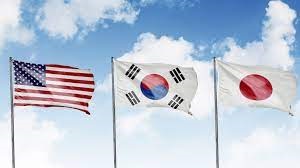Washington/San Francisco/Seoul, (Samajweekly) The top diplomats of South Korea, the US and Japan have reiterated that the growing military cooperation between North Korea and Russia poses a “serious threat” to peace and stability, vowing to act together with the international community over the issue.
Foreign Minister Park Jin, US Secretary of State Antony Blinken and Japanese Foreign Minister Yoko Kamikawa reaffirmed the consensus during the trilateral talks on the sidelines of the Asia-Pacific Economic Cooperation (APEC) summit in San Francisco on Tuesday (local time), as they are stepping up cooperation to address North Korean threats and other regional and global issues.
The three-way talks took place less than two months after they held brief talks on the sidelines of the UN General Assembly in New York, Yonhap news agency reported.
Their meeting came as Washington is seeking greater cooperation from regional allies and partners in the middle of multiple security challenges, including the war between Israel and the Hamas militant group and Russia’s protracted war in Ukraine.
“Looking around the world, there is so much work for us to do together,” Blinken said, noting that the agenda for Tuesday’s meeting included North Korea’s military cooperation with Russia, support for Ukraine and other regional and global issues.
Park noted that cooperation among the three nations has been reaching “unprecedented heights” since the summit between President Yoon Suk Yeol, US President Joe Biden and Japanese Prime Minister Fumio Kishida at Camp David in August.
“The agreements among our leaders are, one by one, bearing fruit,” he noted, pointing to the arrangements from the trilateral summit, which include holding various trilateral meetings on various topics, including space, on a regular basis.
He added, “The rules-based order is facing multiple challenges in this poly-crisis era. Strengthening cooperation among like-minded countries is more important than ever.”
The three discussed “the situation in the Middle East, the North Korea’s increasingly destabilising actions, including Pyongyang’s support for Russia amid Russia’s war of aggression, and the importance of greater economic cooperation,” State Department Spokesperson Matthew Miller said.
They “reaffirmed their commitment to build on the historic Camp David Summit to enhance US-South Korea-Japan trilateral efforts in strengthening regional security, promoting economic prosperity, and advancing a free and open Indo-Pacific,” Miller added.
Burgeoning military relations between North Korea and Russia, and the recent forced repatriation of North Korean defectors in China, were among the key agenda items for Tuesday’s meeting, Seoul’s Foreign Ministry said.
“The Ministers and Secretary of the three countries again highlighted that the Russia-North Korea military cooperation is a serious threat to international peace and stability beyond the Korean Peninsula,” the Ministry added.
They “agreed to respond together with the international community based on closed coordination among South Korea, the US and Japan,” it said.
At the talks, they reaffirmed the commitment to helping promote human rights in North Korea and agreed to continue working together at the UN Security Council level.
The top diplomats also pledged to bolster efforts to block Pyongyang’s method of financing through illicit cyberactivities used to fund its nuclear and missile development.
Noting the importance of three-way cooperation in economic security, from supply chains, space and cutting-edge technologies, they vowed to continue the close partnership in these fields.
Tuesday’s talks came ahead of the high-stakes summit between President Joe Biden and Chinese President Xi Jinping, which is slated to take place in San Francisco on Wednesday.
Seoul and Tokyo have watched developments in the relations between the world’s two largest economies due to the implications for their diplomacy, security and trade.
Last week, Blinken visited Tokyo and Seoul on a multi-nation trip, during which he highlighted US’ “intense focus” on the Indo-Pacific despite the Israel-Hamas war and Russia’s war in Ukraine.









